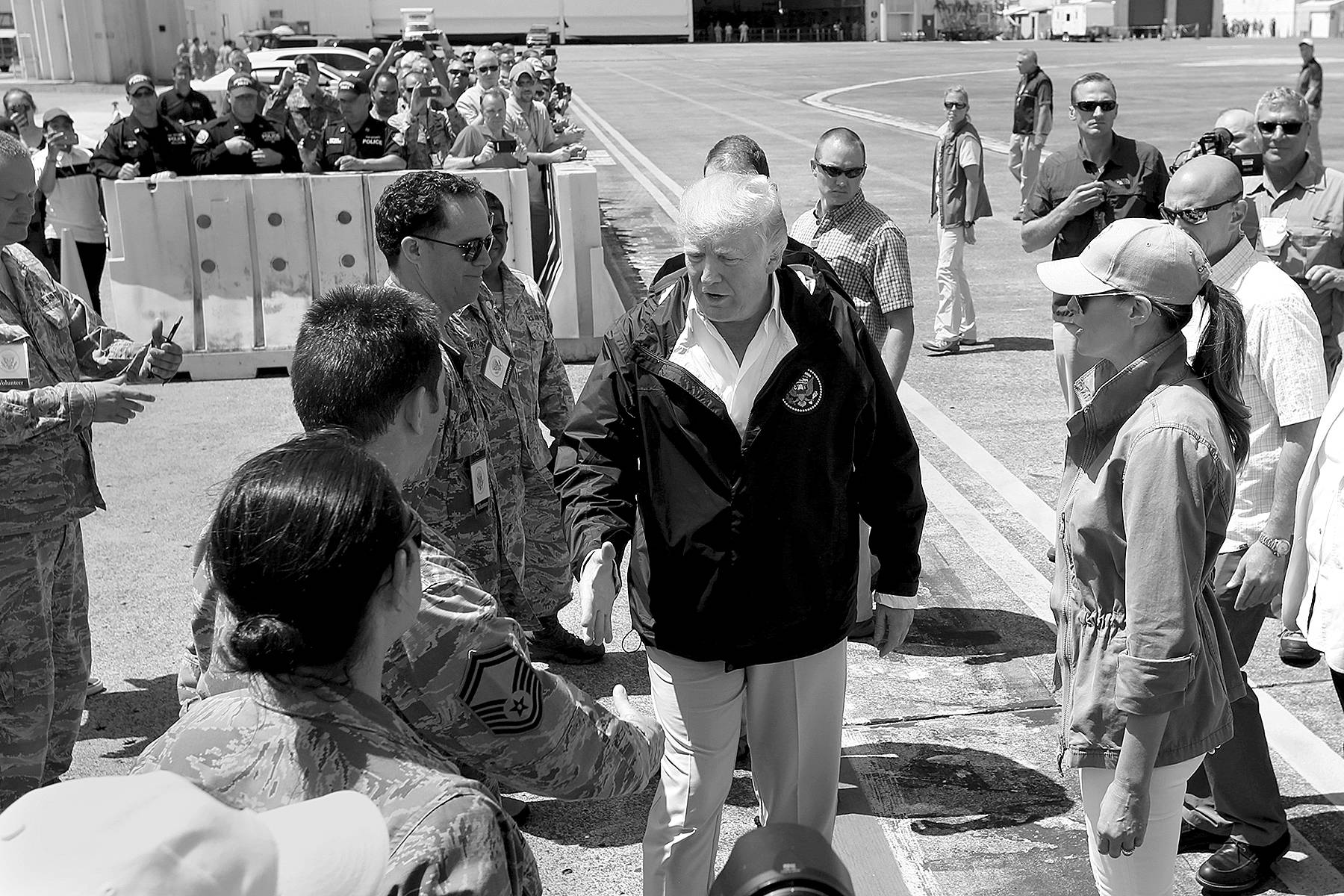By Molly Hennessy-Fiske and Laura King
Los Angeles Times
SAN JUAN, Puerto Rico — Nearly two weeks after Hurricane Maria ravaged Puerto Rico, President Donald Trump arrived Tuesday, bearing a message that the battered U.S. territory was not being slighted in its quest for recovery help.
In a televised meeting with leaders of the recovery effort in a hangar at Muniz Air National Guard Base, Trump struck an upbeat note, praising the “amazing job” by first responders, the military and his own administration in the wake of the Category 4 storm.
But as sometimes happens when Trump makes off-the-cuff comments, the tone of some of his arrival remarks seemed jarring. He made an oddly jovial reference to the cost of the recovery effort, telling assembled officials: “I hate to tell you, Puerto Rico, but you threw our budget a little out of whack!”
The president then added: “But that’s fine.”
Trump also referred favorably to the official death count on the island — 16, but expected to rise — by comparing it to the fatality toll when Hurricane Katrina hit New Orleans in 2005, killing an estimated 1,800 people.
“Sixteen people certified versus in the thousands,” he said. “You can be very proud.”
Puerto Rico is struggling to recover from the devastating hurricane that raked the island on Sept. 20, knocking out the power grid, snatching away cellphone service, isolating dozens of rural communities and leaving hundreds of thousands scrambling for food, water, medicine, cash and gasoline.
Some residents welcomed Trump’s visit as a sign that more aid was on the way, but were disturbed by earlier comments seen as disparaging of Puerto Ricans and their local leaders.
“He needs to see the devastation. He needs to put his own thoughts and politics aside,” said Divinia Marin, 55, whose home flooded during the storm.
Earlier in the day, Puerto Rico Gov. Ricardo Rossello had pointed to nascent signs of recovery, but said he would seek to convey the enormous scope of the disaster to the visiting president.
“We need more help,” the governor told reporters in San Juan as Trump was en route. “It’s 3.4 million U.S. citizens who we need to get that water, that food — we still need to do a lot more.”
Leaving Washington, Trump hailed his administration’s recovery efforts in the territory, shrugging off criticism that the initial federal response was less robust than similar efforts when hurricanes struck Texas and Florida.
“It’s now acknowledged what a great job we’ve done,” Trump told reporters at the White House as he and first lady Melania Trump prepared to depart the White House by helicopter before their flight to San Juan aboard Air Force One.
“In Texas and in Florida, we get an A-plus,” the president said. “And I’ll tell you what — I think we’ve done just as good in Puerto Rico.”
During his visit, the president made a seeming attempt to back away from days of Twitter attacks on San Juan Mayor Carmen Yulin Cruz —though upon arriving, he seemed to take a dig at her by praising Rosello, who has been careful to couple appeals for more aid with praise for the administration.
“Right from the beginning this governor did not play politics,” Trump said in the hangar meeting, to applause.
Over the weekend, Trump derided the mayor’s “poor leadership” and implied that Puerto Ricans were not doing enough to help themselves. He also indirectly slammed the mayor in a tweet decrying “politically motivated ingrates” who criticized the scope and scale of the initial relief effort.
Embarking on his trip, Trump said the mayor had “come back a long way,” though without detailing what in Cruz’s stance had changed.
The mayor, who has made no direct response to Trump’s Twitter attacks, was among those who shook hands with the president on his arrival, but she was not invited to speak during his initial talks.
In his departure remarks in Washington, Trump voiced implicit criticism of Puerto Rican officials not heard during visits to Texas or Florida, saying that “at a local level, they have to give us more help.”
Despite continuing dire need, Rossello pointed to some improving conditions. The average wait for gas was reduced from seven hours to an hour this week, he said. About 40 percent of the population had cellphone service and more than half now have running water, he said.
Federally directed aid to Puerto Rico and the U.S. Virgin Islands has dramatically picked up in recent days. But critics point to initial slowness in waiving the Jones Act, which restricts foreign-flagged shipping in U.S. waters, coupled with a delay in appointing an on-the-ground military commander to coordinate relief and a lag in dispatching a Navy hospital vessel, the Comfort.
On a San Juan street corner, a half dozen cab drivers awaiting fares debated the significance of Trump’s visit.
“He needs to see the mountain areas” where roads are still blocked and towns cut off, said Frankie Perez, 52. The others agreed. “He’s not going to the bad areas,” said Giovanni Maisonet, 39.
But Perez, whose own home was left darkened and sweltering by the power cutoff, was impressed that Trump had come at all, especially given the mass shooting in Las Vegas that killed at least 59 people.
“We’re struggling,” he said. “I’m for the military here — they’re doing a lot of good. But we need light. We’re part of the U.S.”




